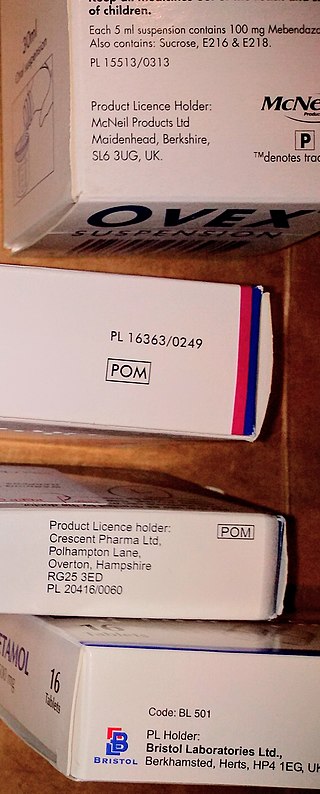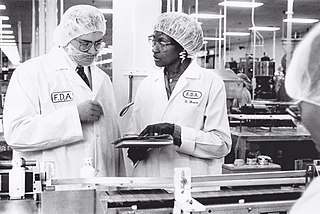Related Research Articles


A generic drug is a pharmaceutical drug that contains the same chemical substance as a drug that was originally protected by chemical patents. Generic drugs are allowed for sale after the patents on the original drugs expire. Because the active chemical substance is the same, the medical profile of generics is equivalent in performance compared to their performance at the time when they were patented drugs. A generic drug has the same active pharmaceutical ingredient (API) as the original, but it may differ in some characteristics such as the manufacturing process, formulation, excipients, color, taste, and packaging.
Prescription drug list prices in the United States continually rank among the highest in the world. The high cost of prescription drugs became a major topic of discussion in the 21st century, leading up to the American health care reform debate of 2009, and received renewed attention in 2015. One major reason for high prescription drug prices in the United States relative to other countries is the inability of government-granted monopolies in the American health care sector to use their bargaining power to negotiate lower prices, and the American payer ends up subsidizing the world's R&D spending on drugs.

A prescription drug is a pharmaceutical drug that is permitted to be dispensed only to those with a medical prescription. In contrast, over-the-counter drugs can be obtained without a prescription. The reason for this difference in substance control is the potential scope of misuse, from drug abuse to practicing medicine without a license and without sufficient education. Different jurisdictions have different definitions of what constitutes a prescription drug.

The pharmaceutical industry discovers, develops, produces, and markets pharmaceutical drugs for the use as medications to be administered to patients, with the aim to cure and prevent diseases, or alleviate symptoms. Pharmaceutical companies may deal in generic or brand medications and medical devices. They are subject to a variety of laws and regulations that govern the patenting, testing, safety, efficacy using drug testing and marketing of drugs. The global pharmaceuticals market produced treatments worth $1,228.45 billion in 2020 and showed a compound annual growth rate (CAGR) of 1.8%.
A biopharmaceutical, also known as a biological medical product, or biologic, is any pharmaceutical drug product manufactured in, extracted from, or semisynthesized from biological sources. Different from totally synthesized pharmaceuticals, they include vaccines, whole blood, blood components, allergenics, somatic cells, gene therapies, tissues, recombinant therapeutic protein, and living medicines used in cell therapy. Biologics can be composed of sugars, proteins, nucleic acids, or complex combinations of these substances, or may be living cells or tissues. They are isolated from living sources—human, animal, plant, fungal, or microbial. They can be used in both human and animal medicine.
The pharmaceutical industry in India was valued at an estimated US$42 billion in 2021 and is estimated to reach $130 billion by 2030. India is the world's largest provider of generic medicines by volume, with a 20% share of total global pharmaceutical exports. It is also the largest vaccine supplier in the world by volume, accounting for more than 60% of all vaccines manufactured in the world. Indian pharmaceutical products are exported to various regulated markets including the US, UK, European Union and Canada.

Zydus Lifesciences Limited, formerly known as Cadila Healthcare Limited, is an Indian multinational pharmaceutical company headquartered in Ahmedabad, which is primarily engaged in the manufacture of generic drugs. The company ranked 100th in the Fortune India 500 list in 2020.
In the United States, a pharmacy benefit manager (PBM) is a third-party administrator of prescription drug programs for commercial health plans, self-insured employer plans, Medicare Part D plans, the Federal Employees Health Benefits Program, and state government employee plans. According to the American Pharmacists Association, "PBMs are primarily responsible for developing and maintaining the formulary, contracting with pharmacies, negotiating discounts and rebates with drug manufacturers, and processing and paying prescription drug claims." PBMs operate inside of integrated healthcare systems, as part of retail pharmacies, and as part of insurance companies.
Pharmaceutical policy is a branch of health policy that deals with the development, provision and use of medications within a health care system. It embraces drugs, biologics, vaccines and natural health products.

First Databank (FDB) is a major provider of drug and medical device databases that help inform healthcare professionals to make decisions. FDB partners with information system developers to deliver useful medication- and medical device-related information to clinicians, business associates, and patients. FDB is part of Hearst and the Hearst Health network.
A biosimilar is a biologic medical product that is almost an identical copy of an original product that is manufactured by a different company. Biosimilars are officially approved versions of original "innovator" products and can be manufactured when the original product's patent expires. Reference to the innovator product is an integral component of the approval.
Approved Drug Products with Therapeutic Equivalence Evaluations, commonly known as the Orange Book, is a publication produced by the United States Food and Drug Administration (FDA), as required by the Drug Price and Competition Act.

Sarfaraz Khan Niazi he migrated to Karachi, Pakistan in 1962, and to the United States in 1970. He is an expert in biopharmaceutical manufacturing and has worked in academia, industry, and as an entrepreneur. He has written books in pharmaceutical sciences, biotechnology, consumer healthcare, and poetry. He has translated ghazals of the Urdu poet Ghalib.

The Food and Drug Administration Safety and Innovation Act of 2012 (FDASIA) is a piece of American regulatory legislation signed into law on July 9, 2012. It gives the United States Food and Drug Administration (FDA) the authority to collect user fees from the medical industry to fund reviews of innovator drugs, medical devices, generic drugs and biosimilar biologics. It also creates the breakthrough therapy designation program and extends the priority review voucher program to make eligible rare pediatric diseases. The measure was passed by 96 senators voting for and one voting against.
AMCP is a professional organization representing the interests of pharmacists who practice in managed care settings. It publishes the Journal of Managed Care & Specialty Pharmacy.
The Association for Accessible Medicines (AAM), Washington, D.C., is a trade association representing the manufacturers and distributors of generic prescription drugs, manufacturers and distributors of bulk pharmaceutical chemicals, and suppliers of other goods and services to the U.S. generic drug industry. As the primary lobby for makers of generic drugs, AAM's stated mission is to advocate for public policies that facilitate timely access to lower-cost, FDA-approved generic and biosimilar medicines by consumers and patients. Over the 10-year period 2008 through 2018, the use of generic drugs generated $2 trillion in U.S. healthcare savings.

Scott Gottlieb is an American physician and investor who served as the 23rd commissioner of the Food and Drug Administration (FDA) from May 2017 until April 2019. He is presently a senior fellow at the conservative think tank the American Enterprise Institute (AEI), a partner at the venture capital firm New Enterprise Associates (NEA), a member of the board of directors of drug maker Pfizer, Inc, a member of the board of directors of Illumina, Inc., a contributor to the cable financial news network CNBC, and a frequent guest on the CBS News program Face the Nation. An elected member of the National Academy of Medicine, Gottlieb is the author of The New York Times best selling book Uncontrolled Spread on the COVID-19 pandemic and the national security vulnerabilities that it revealed.

Janet Woodcock is an American physician and former Acting Commissioner of the U.S. Food and Drug Administration (FDA). She joined the FDA in 1986, and has held a number of senior leadership positions there, including terms as the Director of Center for Drug Evaluation and Research (CDER) from 1994 to 2004 and 2007 to 2021.
Viatris Inc. is an American global pharmaceutical and healthcare corporation headquartered in Canonsburg, Pennsylvania. The corporation was formed through the merger of Mylan and Upjohn, a legacy division of Pfizer, on November 16, 2020.
References
- ↑ Perrone, Matthew (June 3, 2008). "Electronic prescribing push clicks with Congress". Associated Press.
- ↑ "Home". PCMA.
- ↑ Larkin, Catherine (June 25, 2009). "Biotech Drugs Need Only 7 Years Protection, U.S. Says". Bloomberg.
- ↑ Ackley, Kate (July 9, 2009). "Key Senators Targeted in New Health Care Ad Campaign". Roll Call.
- ↑ "About The Project". COVID-19 Vaccine Education and Equity Project. Archived from the original on 2023-09-21.